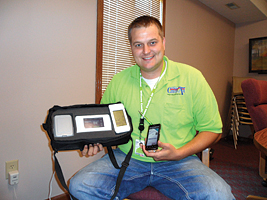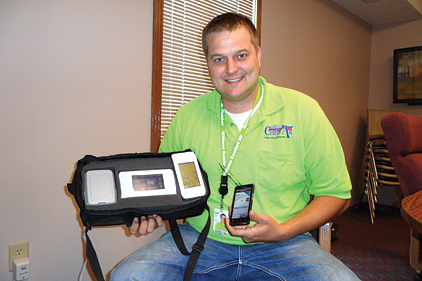
|
| Josh Huck, service manager of Williams Comfort Air in Indianapolis, shows the compact connectivity kit that allows company sales people to give live demonstrations of the Internet-Connected system. |
HVAC contractors across the United States are working with a select group of homeowners looking to use their mobile devices to remotely control their indoor environment. A few are also partnering with Home Automation dealers to use Wi-Fi thermostats as a complement to high-tech lighting, security, and audio/visual systems for high-end homes. It is a niche market now but that should change significantly in the next two years as consumers with smart phones and tablets become aware of the remote control capability of HVAC thermostats and systems. That pace of change will also be affected as traditional contractors realize home connectivity is more than a gadget or one more thing that could go wrong.
Missouri Dealer Embraces Technology
Travis Seeger, general manager of Chesterfield Service in Chesterfield, Mo., is embracing the new technology. Chesterfield Service, a residential contractor with 14 employees, has installed several Nexia Home Intelligence systems, which allows the homeowner to use an Internet-connected phone or tablet PC to control temperature, door locks, and video cameras. The company also signed up to be a Nest Certified Dealer. Nest is an Internet-connected thermostat which is not programmable in the traditional sense. It “learns” the habits of the homeowners and automatically adjusts temperatures to fit their lifestyle. The company is new to the HVAC market, and initially marketed directly to the consumer and used retailers like Best Buy. The company quickly found out, however, that even experienced DIY enthusiasts weren’t willing to tackle the installation of a thermostat on their own.
Seeger said he has even partnered with a local dealer for Control4, a marketer of high-end, home automation systems. His company recently completed the mechanical system for an elaborate wine cellar and helped build it into the home automation system.
Indiana Contractor Differentiates
Josh Huck, service manager and principal of Williams Comfort Air, Indianapolis, a large residential contractor with 185 employees, believes that home connectivity is one of the things that is going to set his company apart from the competition. His company markets the Honeywell Prestige thermostat, which gives the homeowner the capability to remotely control humidification, dehumidification, and air filtration and gives the contractor the capability to remotely perform diagnostics on the system. According to Huck, the most important feature is the diagnostics. “It has the ability to email us if the temperature ranges are out of a pre-set range, or if humidity goes out of control, or the unit just shuts off. A couple of times we have notified a client of a no-cool or no-heat situation, which has been pretty darn cool,” said Huck.
Huck is passionate about the benefits of home connectivity. “No appliance in the home has more financial bearing on a homeowner, so why wouldn’t they want to control and monitor the system wherever they are?” Williams Comfort Air promotes connectivity on their calls by providing the salespeople with a demo kit and smart phones to show customers the app and then give them the opportunity to choose the upgrade. Both Huck and Seeger went so far as to install a Nexia Home Intelligence system at their offices to help employees become familiar with the technology, which includes remotely controlled door locks with individual pass codes.
Market in the Infant Stage
Both contractors admit the home connectivity market is in the infant stage and a very small percentage of the customer base is choosing the new technology. They also predict that change will come when technicians gain confidence with digital technology and consumers become aware of how easy and affordable it is to control their indoor environment at home, away, or when on vacation.
On the contractor side, it appears to be a generational issue. The owners, executives, and technicians that are of the baby boomer generation tend to be more hands-on and look at connectivity products as gadgets rather than technology that can transform the industry.
“The technicians that do promote connectivity have decent success,” claimed Huck.
Second-generation owners and managers like Seeger and Huck are ready to embrace digital technology. Seeger said, “Once consumers become aware of it [home connectivity] they are going to demand it. If we don’t do it, somebody else is going to jump into it.” Huck added, “Someone is going to figure out how to offer more connectivity into the home, and if we don’t play a part or are resistant to it, we will get pushed out of the way.”
Seeger and Huck are invested in home connectivity, and they plan to position their companies at the forefront of what promises to be a major shift in the HVAC industry.
For more information, visit www.williamscomfortair.com or www.chesterfieldservice.com.
Publication date: 8/20/2012


Report Abusive Comment